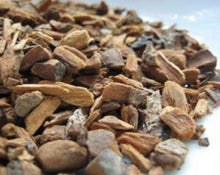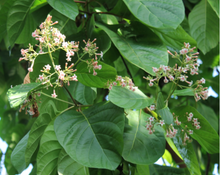Cinchona Bark makes great Detox Tea
Cinchona Bark - Cinchona calisaya Wedd.
Origin: Spain
Used part: Leaf, Bark
Description:
Quinine is a natural substance taken from the bark of a medicinal plant called Cinchona calisaya, also known by several names like quina, quina-amarela, quineira, red chichona, Peruvian bark and bark of the Jesuits. The trees of this medicinal plant originate from forests of South America, and its most used parts are its leaves and the barks of the root, the branches and the trunk, mainly, to make teas with diverse properties like antipyretic, antimaláricas, digestive and healing.
Quinine is the active compound of quinine, a drug used to treat malaria; however, only use of the plant, beverages or supplements containing quinine is not recommended as a remedy for this disease, but only as a way of supplementing treatment. Learn more about the remedy for malaria: Quinine.
Health benefits:
The leaves of the infused plant can be used in cases of urinary problems; the juice of the leaves, in cases of arrest and constipation; leaves and bark infused for the treatment of toothache, measles, malaria, appetite stimulant, general fatigue, diarrhea, dysentery, sore throat, prevention of colds and flu, heart palpitations, cardiac functions and hemorrhoids; peels can be used in cases of convalescence; the leaves rubbed against the body can treat scabies; the leaves and peel infused can be an astringent to the throat.
Good Herbal Remedy:
- Improve digestion
- Help to detoxify the liver and body
- Have antiseptic and anti-inflammatory action
- Assist in the treatment of malaria
- Fight fever
- Reduce pain in the body
- Combat hair loss and dandruff
Directions:
- Put 2 tbsp to a quart of water
- Let it cook for about 10 minutes from the moment it starts to boil
- Remove from the heat and let stand, covered, for 10 minutes
- Strain and is ready for use.
How to Drink:
Take 2 to 3 cups a day.
Contraindications:
Quinine is contraindicated for pregnant women, children, as well as patients with depression, blood clotting problems, or liver disease. In addition, the use of Quinine should be evaluated when the patient uses other medicines, such as Cisapride, Heparin, Rifamycin or Carbamazepine.




